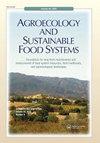未充分利用的食用植物及其对粮食安全的潜在贡献:从当地情况中汲取的经验教训
IF 2.6
3区 农林科学
Q1 AGRICULTURE, MULTIDISCIPLINARY
引用次数: 0
摘要
在墨西哥瓦斯特卡地区,由于公共政策减少了对家庭农业的支持,而倾向于加工过程的商业化,某些食用植物物种被忽视了。本文章由计算机程序翻译,如有差异,请以英文原文为准。
Underutilized food plants and their potential contribution to food security: lessons learned from the local context
In the Huasteca region of Mexico, certain food plant species have been neglected due to public policies that have reduced support for family agriculture and favored the commercialization of process...
求助全文
通过发布文献求助,成功后即可免费获取论文全文。
去求助
来源期刊

Agroecology and Sustainable Food Systems
AGRICULTURE, MULTIDISCIPLINARY-GREEN & SUSTAINABLE SCIENCE & TECHNOLOGY
CiteScore
4.80
自引率
7.70%
发文量
73
期刊介绍:
Agroecology and Sustainable Food Systems is devoted to the rapidly emerging fields of agroecology and food system sustainability. By linking scientific inquiry and productive practice with transformative social action, agroecology provides a foundation for developing the alternative food systems of the future. The journal focuses on the changes that need to occur in the design and management of our food systems in order to balance natural resource use and environmental protection with the needs of production, economic viability, food security, and the social well-being of all people.
Agroecology and Sustainable Food Systems examines our current food systems from production to consumption, and the urgent need to transition to long-term sustainability. The journal promotes the study and application of agroecology for developing alternatives to the complex problems of resource depletion, environmental degradation, a narrowing of agrobiodiversity, continued world hunger, consolidation and industrialization of the food system, climate change, and the loss of farm land. The journal uses a food systems approach, and seeks experiences in agroecology that are on-farm, participatory, change-oriented, and backed by broad-based methodologies of sustainability analysis and evaluation.
 求助内容:
求助内容: 应助结果提醒方式:
应助结果提醒方式:


